
The 1872 United States presidential election was the 22nd quadrennial presidential election, held on Tuesday, November 5, 1872. Despite a split in the Republican Party, incumbent President Ulysses S. Grant defeated Democratic-endorsed Liberal Republican nominee Horace Greeley.

Harriet Elisabeth Beecher Stowe was an American author and abolitionist. She came from the religious Beecher family and became best known for her novel Uncle Tom's Cabin (1852), which depicts the harsh conditions experienced by enslaved African Americans. The book reached an audience of millions as a novel and play, and became influential in the United States and in Great Britain, energizing anti-slavery forces in the American North, while provoking widespread anger in the South. Stowe wrote 30 books, including novels, three travel memoirs, and collections of articles and letters. She was influential both for her writings as well as for her public stances and debates on social issues of the day.
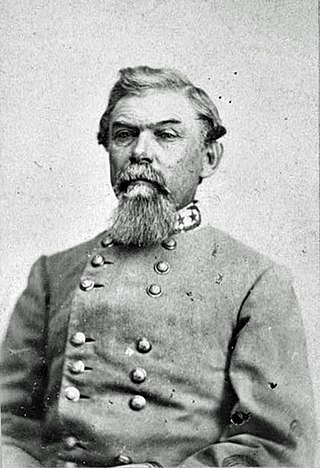
William Joseph Hardee was a career U.S. Army and Confederate States Army officer. For the U.S. Army, he served in the Second Seminole War and in the Mexican–American War, where he was captured and exchanged. In the American Civil War, he sided with the South and became a general. Hardee served in the Western Theater and quarreled sharply with two of his commanding officers, Braxton Bragg and John Bell Hood. He served in the Atlanta Campaign of 1864 and the Carolinas Campaign of 1865, where he surrendered with General Joseph E. Johnston to William Tecumseh Sherman in April. Hardee's writings about military tactics were widely used on both sides in the conflict.

William James Bryan was an American politician, attorney, and prosecutor who was a Democratic U.S. Senator from the American state of Florida. Bryan's stint in the Senate was brief, having been appointed to fill a vacancy the day after Christmas of 1907 — less than three months before his own death at the age of 31.

Charles Beecher was an American minister, composer of religious hymns and a prolific author.
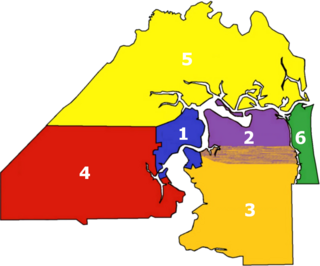
There are more than 500 neighborhoods within the area of Jacksonville, Florida, the largest city in the contiguous United States by area. These include Downtown Jacksonville and surrounding neighborhoods. Additionally, greater Jacksonville is traditionally divided into several major sections with amorphous boundaries: Northside, Westside, Southside, and Arlington, as well as the Jacksonville Beaches.
Mandarin is a neighborhood located in the southernmost portion of Jacksonville, in Duval County, Florida, United States. It is located on the eastern banks of the St. Johns River, across from Orange Park. It's a short drive south of Jacksonville's city center, and is bordered by Beauclerc to the north, Julington Creek to the south and St. John's River to the west.

Kingsley Plantation is the site of a former estate on Fort George Island, in Duval County, Florida, that was named for its developer and most famous owner, Zephaniah Kingsley, who spent 25 years there. It is located at the northern tip of Fort George Island at Fort George Inlet, and is part of the Timucuan Ecological and Historic Preserve managed by the U.S. National Park Service. Kingsley's house is the oldest plantation house still standing in Florida, and the solidly-built village of slave cabins is one of the best preserved in the United States. It is also "the oldest surviving antebellum Spanish Colonial plantation in the United States."

Originating in New England, one particular Beecher family in the 19th century was a political family notable for issues of religion, civil rights, and social reform. Notable members of the family include clergy, educators, authors and artists. Many of the family were Yale-educated and advocated for abolitionism, temperance, and women's rights. Some of the family provided material or ideological support to the Union in the American Civil War. The family is of English descent.
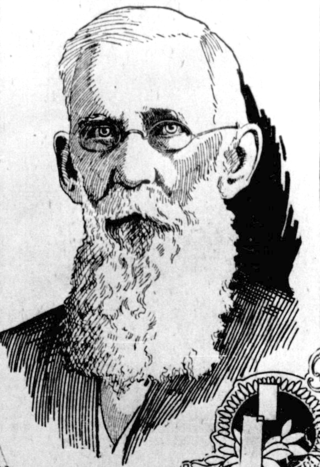
Noble Andrew Hull was a U.S. Representative from Florida and the sixth Lieutenant Governor of Florida.
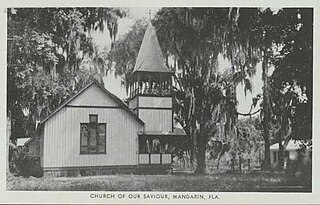
The Church of Our Saviour is an Episcopal church in the Mandarin area of Jacksonville, Florida, U.S. It is located on the St. Johns River at 12236 Mandarin Road. The congregation was founded in 1880 by a group Episcopalians, Church of England members and those from other denominations who wanted to start a new church in the Anglican mode. These people had gathered for Bible readings with Professor Calvin E. Stowe and his famous wife, Harriet Beecher Stowe for many years. They constructed a small but sound church building designed by Ellis and McClure in 1883, which stood until 1964 when Hurricane Dora's winds broke off part of a giant Live Oak and sent it crashing through the church's roof. The Stowe Memorial stained glass window, created by Louis Comfort Tiffany, was completely destroyed. The congregation built a new church in a similar design; it remains an active parish in the Episcopal Diocese of Florida.
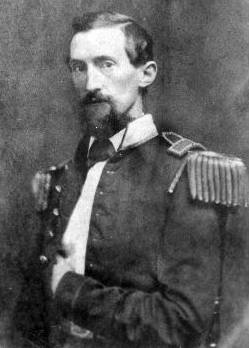
Francis Asbury Shoup, a lawyer from Indianapolis, Indiana, became a brigadier general for the Confederate States Army during the American Civil War.

Palmetto Leaves is a memoir and travel guide written by Harriet Beecher Stowe about her winters in the town of Mandarin, Florida, published in 1873. Already famous for having written Uncle Tom's Cabin (1852), Stowe came to Florida after the U.S. Civil War (1861–1865). She purchased a plantation near Jacksonville as a place for her son to recover from the injuries he had received as a Union soldier and to make a new start in life. After visiting him, she became so enamored with the region she purchased a cottage and orange grove for herself and wintered there until 1884, even though the plantation failed within its first year. Parts of Palmetto Leaves appeared in a newspaper published by Stowe's brother, as a series of letters and essays about life in northeast Florida.
Mellen Clark Greeley was an American architect in Jacksonville, Florida. He was considered to be the "Dean of Jacksonville Architects".

The 1976 United States presidential election in Florida took place on November 2, 1976. All fifty states and the District of Columbia were part of the 1976 United States presidential election. Florida voters chose seventeen electors to the Electoral College, who voted for president and vice president. Florida was won by Georgia Governor Jimmy Carter by a margin of 5.29%, giving him the state's 17 electoral votes. This result made Florida slightly over 4% more Democratic than the nation-at-large-- the last time Florida voted more Democratic than the nation in a presidential election. Carter did well in the South, with Arkansas and his home state of Georgia giving him particularly large margins. Florida, together with other growing Southern states such as Virginia and Texas, however, were more competitive, as Ford did well in many growing counties in the South, in many cases largely inhabited by transplants. In Florida, Ford did well in coastal southwestern Florida, most of which had turned Republican as early as the late 1940s and had stuck with Goldwater in 1964. He also carried the large, then-typically Republican counties of Orange, Palm Beach, and Pinellas, although by narrow margins in the latter two cases. Carter carried the home counties of Miami (Dade), Tampa (Hillsborough), and Jacksonville (Duval) by healthy margins, and dominated rural Florida. He also became the first Democrat to win Broward County since 1944.

The architecture of Jacksonville is a combination of historic and modern styles reflecting the city's early position as a regional center of business. According to the National Trust for Historic Preservation, there are more buildings built before 1967 in Jacksonville than any other city in Florida, though few structures in the city center predate the Great Fire of 1901. Numerous buildings in the city have held state height records, dating as far back as 1902, and last holding a record in 1981.

James Chaplin Beecher, was an American Congregationalist minister and Colonel for the Union Army during the American Civil War. He came from the Beecher family, a prominent 19th century American religious family.
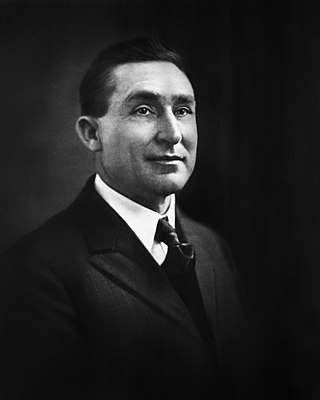
Van Cicero Swearingen was an American attorney and politician who served as the 21st Florida Attorney General, serving from 1917 until 1921.
Julington Creek is a stream in Duval County, Florida, near Jacksonville. Durbin Creek is a tributary. Julington Creek feeds into the St Johns River widening out into Old Bull Bay. Both are navigable by paddlecraft and has a marina on it.















